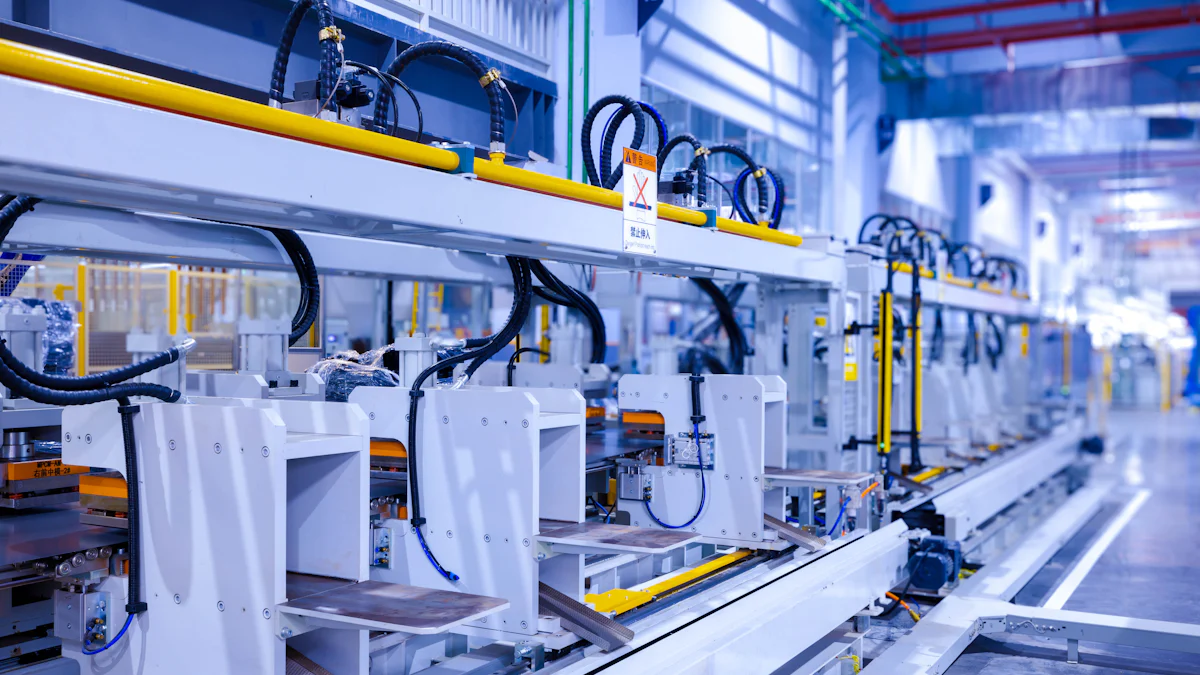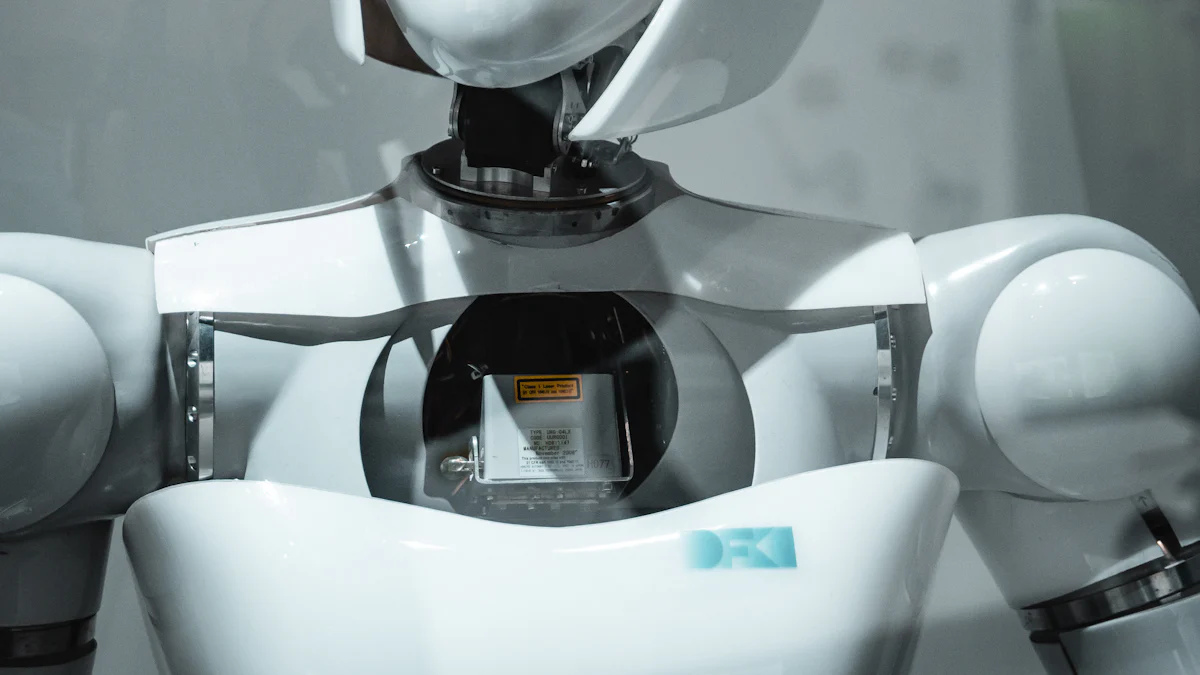AI-Powered Robots: Shaping Tomorrow's Industries

AI-powered robots represent a significant leap in technology, combining artificial intelligence with robotics to create machines that can learn and adapt. These robots enhance efficiency and precision in various tasks. AI plays a crucial role in modern robotics by enabling machines to process information and make decisions. Industries experience transformative changes due to these advancements. The Future of AI promises even more integration, leading to smarter and more autonomous robots that will reshape how industries operate.
The Rise of AI-Powered Robots

Historical Context
Early Developments in Robotics
Robotics began its journey in the mid-20th century. Engineers and scientists created the first robots to perform repetitive tasks. These early machines operated with limited capabilities. They relied on pre-programmed instructions and lacked the ability to adapt. Despite their limitations, these robots revolutionized industries like manufacturing. They increased productivity and reduced human error.
Integration of AI in Robotics
The integration of artificial intelligence marked a turning point in robotics. Researchers introduced AI to enable robots to learn and make decisions. This development allowed robots to process data and adapt to new situations. AI-powered robots could now perform complex tasks with greater precision. Industries began to see the potential for these intelligent machines to transform operations. The Future of AI in robotics promised even more advancements.
Technological Advancements
Machine Learning and Robotics
Machine learning has become a cornerstone of modern robotics. It allows robots to improve their performance over time. By analyzing data, robots can identify patterns and optimize their actions. This capability enhances their efficiency and accuracy. Machine learning enables robots to tackle tasks that require adaptability. As a result, industries benefit from increased productivity and reduced costs.
Sensor and Actuator Innovations
Sensors and actuators play a crucial role in robotics. Sensors provide robots with information about their environment. They detect changes and help robots respond appropriately. Actuators enable robots to move and interact with objects. Recent innovations have improved the sensitivity and precision of these components. Enhanced sensors and actuators allow robots to perform delicate tasks with ease. Industries such as healthcare and logistics benefit from these advancements.
Current Applications in Industries
Manufacturing
Automation and Efficiency
Manufacturing industries have embraced AI-powered robots to enhance automation and efficiency. These robots perform repetitive tasks with speed and precision, reducing the need for human intervention. They assemble products, weld components, and handle materials with remarkable accuracy. By automating these processes, manufacturers increase production rates and minimize errors. This leads to cost savings and improved product quality.
Quality Control and Precision
AI-powered robots play a vital role in quality control within manufacturing. They inspect products for defects and ensure adherence to specifications. Equipped with advanced sensors, these robots detect even the slightest imperfections. Their precision surpasses human capabilities, resulting in higher-quality products. Manufacturers rely on these robots to maintain consistency and meet customer expectations.
Healthcare
Surgical Robots
In healthcare, surgical robots have revolutionized medical procedures. Surgeons use these robots to perform complex surgeries with enhanced precision. The robots' steady hands and precise movements reduce the risk of complications. Patients benefit from shorter recovery times and less postoperative pain. Surgical robots have become indispensable tools in modern medicine.
Patient Care and Assistance
AI-powered robots also assist in patient care. They help nurses and caregivers with routine tasks, such as monitoring vital signs and administering medication. These robots provide companionship to patients, especially the elderly and those with disabilities. By taking on these responsibilities, robots allow healthcare professionals to focus on more critical aspects of patient care.
Logistics and Supply Chain
Inventory Management
Logistics companies utilize AI-powered robots for efficient inventory management. These robots track stock levels, organize warehouses, and manage inventory data. They ensure that products are stored correctly and retrieved promptly. By optimizing inventory processes, companies reduce waste and improve supply chain efficiency.
Autonomous Delivery Systems
Autonomous delivery systems represent a significant advancement in logistics. AI-powered robots transport goods from warehouses to customers' doorsteps. They navigate through traffic and obstacles, ensuring timely deliveries. These systems reduce the need for human drivers and lower transportation costs. As a result, companies enhance their delivery services and customer satisfaction.
Future of AI in Robotics
Emerging Trends
Collaborative Robots (Cobots)
Collaborative robots, or cobots, represent a significant trend in the Future of AI. Unlike traditional robots, cobots work alongside humans in shared spaces. They assist with tasks that require precision and adaptability. Cobots enhance productivity by performing repetitive or dangerous tasks, allowing human workers to focus on more complex activities. Industries such as manufacturing and healthcare benefit from cobots' ability to learn and adapt quickly. Their integration into workplaces promises to improve efficiency and safety.
AI in Service Industries
AI's role in service industries continues to expand. Robots equipped with AI perform tasks in hospitality, retail, and customer service sectors. They greet customers, provide information, and handle transactions. These robots enhance customer experiences by offering personalized services. In the hospitality industry, AI-powered robots assist with room service and concierge duties. Retailers use them for inventory management and customer assistance. The Future of AI in service industries promises more interactive and efficient customer interactions.
Ethical and Social Implications
Job Displacement Concerns
The rise of AI-powered robots raises concerns about job displacement. As robots take on tasks traditionally performed by humans, some fear job losses. However, AI also creates new opportunities. Workers may need to acquire new skills to adapt to changing job markets. Industries must balance automation with workforce development. By investing in training programs, companies can help employees transition to new roles. The Future of AI requires careful consideration of its impact on employment.
Privacy and Security Issues
AI-powered robots collect and process vast amounts of data. This capability raises privacy and security concerns. Industries must ensure that data collected by robots remains secure. Protecting sensitive information is crucial to maintaining trust. Companies must implement robust security measures to prevent data breaches. Additionally, ethical considerations must guide the use of AI in robotics. Transparency and accountability are essential in addressing privacy concerns. The Future of AI in robotics depends on responsible data management.
AI-powered robots have significantly impacted various industries by enhancing efficiency and precision. They have transformed manufacturing, healthcare, and logistics, leading to improved productivity and quality. The Future of AI holds promise for even more advancements, with smarter and more autonomous robots reshaping industry operations. Embracing these AI advancements is crucial for staying competitive and innovative. Industries must prepare for this technological evolution by investing in workforce development and ethical considerations. By doing so, they can harness the full potential of AI-powered robotics.
See Also
The Impact of AI on Future Generations
Unleashing GenAI's Influence Across Various Sectors
GenAI's Potential to Transform Employment Landscape
